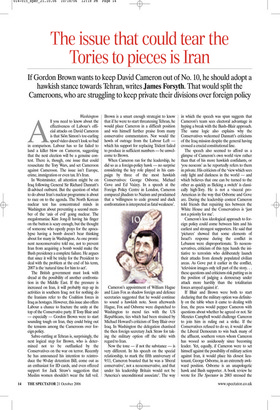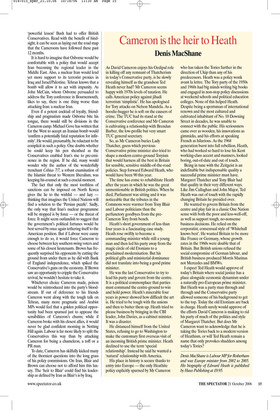The issue that could tear the Tories to pieces is Iran
If Gordon Brown wants to keep David Cameron out of No. 10, he should adopt a hawkish stance towards Tehran, writes James Forsyth. That would split the Cameroons, who are struggling to keep private their divisions over foreign policy
Washington
All you need to know about the effectiveness of Labour’s official attacks on David Cameron is that Siôn Simon’s toe-curling spoof video doesn’t look so bad in comparison. Labour has so far failed to land a killer blow on Cameron, suggesting that the next election will be a genuine contest. There is, though, one issue that could resuscitate the Tory Wars, and set Cameroon against Cameroon. The issue isn’t Europe, crime, immigration or even tax. It’s Iran.
In Westminster, all attention might be on Iraq following General Sir Richard Dannatt’s ill-advised outburst. But the question of what to do about Iran’s nuclear programme is about to race on to the agenda. The North Korean nuclear test has concentrated minds in Washington about preventing a second member of the ‘axis of evil’ going nuclear. The megalomaniac Kim Jong-Il having his finger on the button is scary enough, but the thought of someone who openly prays for the apocalypse having a bomb doesn’t bear thinking about for many in Washington. As one prominent neoconservative told me, not to prevent Iran from acquiring a bomb would make the Bush presidency a complete failure. He argues that since it will be tricky for the President to deal with the problem at the end of his term, 2007 is the ‘natural time for him to act’.
The British government must look with dread at the possibility of another confrontation in the Middle East. If the pressure is increased on Iran, it will probably step up its activities in southern Iraq; not for nothing do the Iranians refer to the Coalition forces in Iraq as hostages. However, this issue also offers Labour a chance to fracture the unity at the top of the Conservative party. If Tony Blair and — especially — Gordon Brown were to start sounding tough on Iran, they could bring out the tensions among the Cameroons over foreign policy.
Sabre-rattling at Tehran is, surprisingly, the next logical step for Brown, who is determined not to be outflanked by the Conservatives on the war on terror. Recently he has announced his intention to reintroduce the 90-day detention Bill, come out as an enthusiast for ID cards, and even offered support for Jack Straw’s suggestion that Muslim women shouldn’t wear the full veil. Brown is a smart enough strategist to know that if he were to start threatening Tehran, he would place Cameron in a difficult position and win himself further praise from many conservative commentators. Nor would the howls of outrage from the Labour Left which his support for replacing Trident failed to produce in sufficient numbers — be unwelcome to Brown.
When Cameron ran for the leadership, he did so as a foreign-policy hawk — no surprise considering the key role played in his campaign by three of the most hawkish Conservatives: George Osborne, Michael Gove and Ed Vaizey. In a speech at the Foreign Policy Centre in London, Cameron compared jihadism to Nazism and proclaimed that a ‘willingness to cede ground and duck confrontation is interpreted as fatal weakness’.
Cameron’s appointment of William Hague and Liam Fox as shadow foreign and defence secretaries suggested that he would continue to sound a hawkish note. Soon afterwards Hague, Fox and Osborne were dispatched to Washington to mend ties with the US Republicans, ties which had been strained by Michael Howard’s criticism of Tony Blair over Iraq. In Washington the delegation chastised the then foreign secretary Jack Straw for taking the military option off the table with regard to Iran.
Now the tone — if not the substance — is very different. In his speech on the special relationship, to mark the fifth anniversary of 9/11, Cameron boasted that he was a ‘liberal conservative’, not a neoconservative, and that under his leadership Britain would not be ‘America’s unconditional associate’. The way in which the speech was spun suggests that Cameron’s team sees electoral advantage in hyping a break with the Bush–Blair approach. The same logic also explains why the Conservatives welcomed Dannatt’s criticisms of the Iraq mission despite the general having crossed a crucial constitutional line.
The speech also seemed to afford us a glimpse of Cameron’s own world view rather than that of his more hawkish confidants, or ‘you neocons’ as he reportedly refers to them in private. His criticism of the ‘view which sees only light and darkness in the world — and which believes that one can be turned to the other as quickly as flicking a switch’ is classically high-Tory. He is not a visceral proAmerican in the way that Osborne and Gove are. During the leadership contest Cameron told friends that repairing ties between the White House and the Conservatives is ‘just not a priority for me’.
Cameron’s less ideological approach to foreign policy could come between him and his earliest and strongest supporters. He said that ‘pictures’ showed that some elements of Israel’s response during the conflict in Lebanon were disproportionate. To neoconservatives, criticism of this type hands the initiative to terrorists who deliberately launch their attacks from densely populated civilian areas. As Gove put it earlier in the conflict, ‘television images only tell part of the story.. . these questions and criticisms risk putting us in the position of judging a democracy under attack more harshly than the totalitarian forces arrayed against it’.
If Blair and Brown were both to start declaring that the military option was definitely on the table when it came to dealing with Iran, the press would pepper Cameron with questions about whether he agreed or not. Sir Menzies Campbell would challenge Cameron to join him in ruling out a strike. If the Conservatives refused to do so, it would allow the Liberal Democrats to win back many of the affluent, southern voters whom Cameron has wooed so assiduously since becoming leader. Yet, equally, if Cameron were to set himself against the possibility of military action against Iran, it would place his closest lieutenant, George Osborne, in an extremely awkward position. Osborne is an unapologetic hawk and Bush supporter. A book review he wrote for The Spectator in 2003 stressed the ‘powerful lesson’ Bush had to offer British Conservatives. Read with the benefit of hindsight, it can be seen as laying out the road map that the Cameroons have followed these past 12 months.
It is hard to imagine that Osborne would be comfortable with a policy that would accept Iran becoming the regional leader in the Middle East. Also, a nuclear Iran would lend yet more support to its terrorist proxies in Iraq and Israel/Palestine. Tehran knows that a bomb will allow it to act with impunity. As John McCain, whom Osborne persuaded to address the Tory conference in Bournemouth, likes to say, there is one thing worse than attacking Iran: a nuclear Iran.
Even if a potent cocktail of loyalty, friendship and pragmatism made Osborne bite his tongue, there would still be divisions in the Cameron camp. Michael Gove has written that for the West to accept an Iranian bomb would ‘confirm a potentially fatal reputation for infirmity’. He would, presumably, be reluctant to be complicit in such a policy. One doubts whether he could keep his pen sheathed as the Conservatives enabled Iran’s rise to pre-eminence in the region. If he did, many would wonder why the author of the wonderfully trenchant Celsius 7/7, a robust examination of the Islamist threat to Western liberalism, was keeping his counsel at such a crucial moment.
The fact that only the most toothless of sanctions can be imposed on North Korea gives the lie to the wishful — and lazy thinking that imagines the United Nations will find a solution to the ‘Persian puzzle’. Sadly, the only way that Iran’s nuclear programme will be stopped is by force — or the threat of force. It might seem outlandish to suggest that the government’s political fortunes would be best served by once again tethering itself to the American position. But if Labour were canny enough to do so, it would force Cameron to choose between key southern swing voters and some of his closest lieutenants. Brown has frequently surprised his opponents by cutting the ground from under them as he did with Bank of England independence, which spiked the Conservative’s guns on the economy. If Brown saw an opportunity to cripple the Conservative revival, he wouldn’t hesitate to take it.
Whichever choice Cameron made, poison would be reintroduced into the party’s bloodstream. If out of deference to his friends Cameron went along with the tough talk on Tehran, many more pragmatic and Arabist MPs would feel that a golden political opportunity had been spurned just to appease the sensibilities of Cameron’s chums; while if Cameron broke with his closest allies, it would never be glad confident morning in Notting Hill again. Labour is far more likely to split the Conservatives this way than by attacking Cameron for being a chameleon, a toff or a PR man.
To date, Cameron has skilfully kicked many of the thorniest questions into the long grass of his policy commissions. On Iran, Blair and Brown can choose not to afford him this luxury. The ‘heir to Blair’ could find his leadership as defined by Iran as Blair’s is by Iraq.



































































































 Previous page
Previous page